Payzawat County
Jiashi, Ch'ieh-shih, Faiz Abad | |
|---|---|
.png.webp) Location of Peyziwat County (red) and Kashgar Prefecture (yellow) within Xinjiang | |
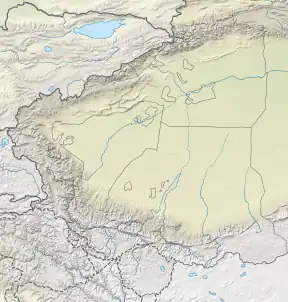 Peyziwat Location of the seat in Xinjiang 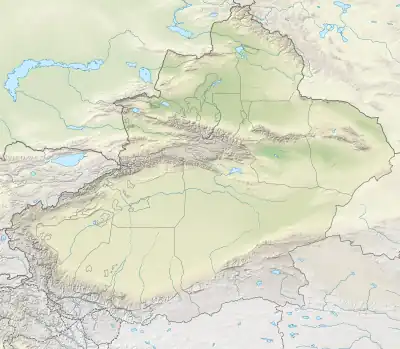 Peyziwat Peyziwat (Xinjiang) 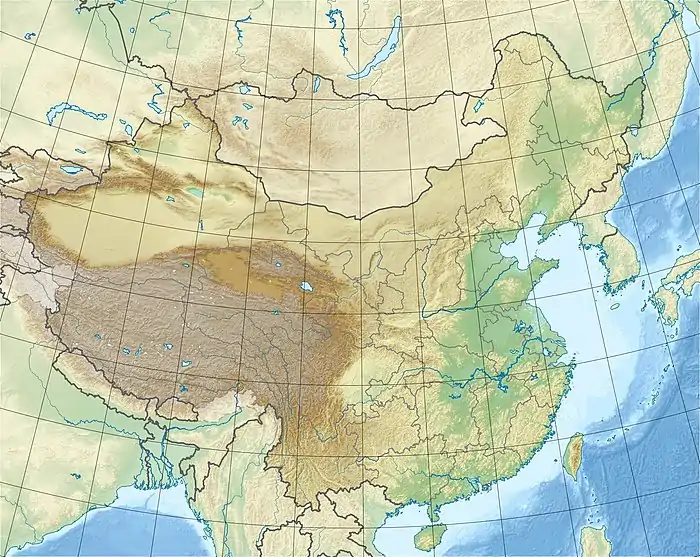 Peyziwat Peyziwat (China) | |
| Coordinates: 39°29′18″N 76°42′45″E / 39.48833°N 76.71250°E | |
| Country | China |
| Autonomous region | Xinjiang |
| Prefecture | Kashgar |
| County seat | Barin[1] |
| Area | |
| • Total | 6,600.68 km2 (2,548.54 sq mi) |
| Population (2020)[3] | |
| • Total | 424,821 |
| • Density | 64/km2 (170/sq mi) |
| Ethnic groups | |
| • Major ethnic groups | Uyghur[4][5][6] |
| Time zone | UTC+8 (China Standard[lower-alpha 1]) |
| Postal code | 844300 |
| Website | www |
| Payzawat County | |||||||||||
|---|---|---|---|---|---|---|---|---|---|---|---|
| Uyghur name | |||||||||||
| Uyghur | پەيزاۋات ناھىيىسى | ||||||||||
| |||||||||||
| Chinese name | |||||||||||
| Simplified Chinese | 伽师县 | ||||||||||
| Traditional Chinese | 伽師縣 | ||||||||||
| |||||||||||
| Alternative Chinese name | |||||||||||
| Simplified Chinese | 排孜阿瓦提县 | ||||||||||
| Traditional Chinese | 排孜阿瓦提縣 | ||||||||||
| |||||||||||
Payzawat County,[8][9][10][6][11] also via SASM/GNC romanization as Payziwat County[12] (Uyghur: پەيزاۋات ناھىيىسى; Chinese: 排孜阿瓦提县[4]), (also Faizabad and Fayzawat) and via Mandarin Chinese as Jiashi County (Chinese: 伽师县) is a county in Kashgar Prefecture, Xinjiang Uyghur Autonomous Region, China, on the western rim of the Taklamakan Desert. To the east, the county borders Maralbexi County, to the south Yopurga County.[4]
Name
The name "Jiashi" was first used in Chinese documents of Tang Dynasty and was adopted when Emperor Guangxu established the county in 1902. Allegedly the word is a transliteration of a celestial Turkic word for jade and has the same origin to "Kashi", Mandarin transliteration for "Kashgar". The Uyghur name "Payziwat" means "God's blessing of fortune" and was sometimes used in documents in Qing Dynasty. Payzawat means 'beautiful land of plenty'.[4]
The name of the region is also transliterated as Faizabad.[11][13][14]
History
Peyziwat County was established in July 1902.[2][15]
In 1981, there was a brief pro-independence rebellion, the Jiashi uprising (1981年伽师县"5·27"暴乱), in the county staged by Uyghur activists after riots in Kashgar.[16][17][18]
The 1997 Jiashi earthquakes, continuing to 2003, were a series of deadly earthquakes in the county.[6] Rebiya Kadeer wrote that her career was significantly affected by the earthquakes, which were "one of the worst natural disasters that had occurred in the Uyghur nation in recent memory." One hundred villages and one thousand homes were leveled. Kadeer organized donations and aid for the area.[19] In February 2002, a 6.7 magnitude earthquake killed 267 people in Maralbexi County and Payzawat County.[20]
On August 27, 2008, two ethnic Uyghur police officers were killed.[21][22]
On October 20, 2014, Shaptul (Xiaputule) was changed from a township to a town.[1][23]
In 2017, Jiashi County Secondary Vocational School (伽师县中等职业学校), among the Xinjiang re-education camps, was increased in size, adding new dormitories and factory warehouses; significant security features were added through the introduction of secure 'military-style management'.[24]
On the night of January 19, 2020, a strong earthquake (2020年喀什地震) damaged buildings and seriously injured at least one person in the county.[7][25][26]
Administrative divisions
Payzawat County includes 6 towns, 7 townships, and one other area:[1][27][28]
| Name | Simplified Chinese | Hanyu Pinyin | Uyghur (UEY) | Uyghur Latin (ULY) | Administrative division code | Notes | |
|---|---|---|---|---|---|---|---|
| Towns | |||||||
| Barin Town | 巴仁镇 | Bārén Zhèn | بارىن بازىرى[29] | barin baziri | 653129100 | ||
| Shekerkol Town | 西克尔库勒镇 | Xīkè'ěrkùlè Zhèn | شېكەركۆل بازىرى | shëkerköl baziri | 653129101 | ||
| Shaptul Town[30] | 夏普吐勒镇 | Xīkè'ěrkùlè Zhèn | شاپتۇل بازىرى | shaptul baziri | 653129102 | formerly Shaptul Township (شاپتۇل يېزىسى / 夏普吐勒乡) | |
| Gholtoghraq Town | 卧里托格拉克镇 | Wòlǐtuōgélākè Zhèn | غولتوغراق بازىرى | gholtoghraq baziri | 653129103 | formerly Gholtoghraq Township (卧里托格拉克乡) | |
| Qizilboyi Town | 克孜勒博依镇 | Kèzīlèbóyī Zhèn | قىزىلبويى بازىرى | qizilboyi baziri | 653129104 | formerly Qizilboyi Township (قىزىلبويى يېزىسى / 克孜勒博依乡) | |
| Qoshawat Town | 和夏阿瓦提镇 | Kèzīlèbóyī Zhèn | قوشئاۋات بازىرى | qosh'awat baziri | 653129107 | formerly Qoshawat Township ( قوشئاۋات يېزىسى / 和夏阿瓦提乡) | |
| Townships | |||||||
| Terim Township | 铁日木乡 | Tiěrìmù Xiāng | تېرىم يېزىسى | tërim yëzisi | 653129200 | ||
| Yengimehelle Township | 英买里乡 | Yīngmǎilǐ Xiāng | يېڭىمەھەللە يېزىسى | yëngimehelle yëzisi | 653129201 | ||
| Janbaz Township | 江巴孜乡 | Jiāngbāzī Xiāng | جانباز يېزىسى | janbaz yëzisi | 653129202 | ||
| Misha Township | 米夏乡 | Mǐxià Xiāng | مىشا يېزىسى | misha yëzisi | 653129205 | ||
| Kizilsu Township[31] | 克孜勒苏乡 | Kèzīlèsū Xiāng | قىزىلسۇ يېزىسى | qizilsu yëzisi | 653129208 | ||
| Gulluk Township | 古勒鲁克乡 | Gǔlèlǔkè Xiāng | گۈللۈك يېزىسى | güllük yëzisi | 653129209 | ||
| Ordeklik Township | 玉代克力克乡 | Yùdàikèlìkè Xiāng | ئۆردەكلىك يېزىسى | Ördeklik yëzisi | 653129210 | ||
Economy
The system of irrigation is well-developed. Agricultural products include wheat, corn, sorghum, cotton and muskmelon. Animal herding is also common, primarily sheep. Specialities of the county include the 'Payzawat melon' (伽师瓜) and white grapes without pits. Industries include tractors, electronics, leather making, construction, and cotton and melon processing.[2]
As of 1885, there was about 55,400 acres (366,889 mu) of cultivated land in Payzawat.[32]
Demographics
| Year | Pop. | ±% p.a. |
|---|---|---|
| 2000 | 311,733 | — |
| 2010 | 381,767 | +2.05% |
| [1] | ||
As of 2015, 437,073 of the 445,846 residents of the county were Uyghur, 8,342 were Han Chinese, 431 were from other ethnic groups.[33]
As of 2009, Uyghurs made up 98.9% of the county's population.[4]
According to the 2002 census, it has a population of 320,000.
As of 1999, 96.46% of the population of Payzawat (Jiashi) County was Uyghur and 3.52% of the population was Han Chinese.[34]
In 1997, Uyghurs made up 97.2% of the county's population.[5]
Climate
| Climate data for Payzawat (1991–2020 normals, extremes 1981–2010) | |||||||||||||
|---|---|---|---|---|---|---|---|---|---|---|---|---|---|
| Month | Jan | Feb | Mar | Apr | May | Jun | Jul | Aug | Sep | Oct | Nov | Dec | Year |
| Record high °C (°F) | 19.0 (66.2) |
19.7 (67.5) |
30.2 (86.4) |
35.3 (95.5) |
36.4 (97.5) |
39.6 (103.3) |
39.8 (103.6) |
40.1 (104.2) |
35.4 (95.7) |
30.8 (87.4) |
25.8 (78.4) |
19.9 (67.8) |
40.1 (104.2) |
| Mean daily maximum °C (°F) | 0.7 (33.3) |
6.9 (44.4) |
16.2 (61.2) |
24.3 (75.7) |
28.6 (83.5) |
32.1 (89.8) |
33.7 (92.7) |
32.3 (90.1) |
28.1 (82.6) |
21.4 (70.5) |
12.0 (53.6) |
2.7 (36.9) |
19.9 (67.9) |
| Daily mean °C (°F) | −5.7 (21.7) |
0.2 (32.4) |
9.1 (48.4) |
16.6 (61.9) |
20.7 (69.3) |
24.1 (75.4) |
25.7 (78.3) |
24.2 (75.6) |
19.7 (67.5) |
12.3 (54.1) |
3.8 (38.8) |
−3.6 (25.5) |
12.3 (54.1) |
| Mean daily minimum °C (°F) | −10.9 (12.4) |
−5.7 (21.7) |
2.5 (36.5) |
9.2 (48.6) |
13.4 (56.1) |
16.7 (62.1) |
18.6 (65.5) |
17.3 (63.1) |
12.6 (54.7) |
5.1 (41.2) |
−2.3 (27.9) |
−8.1 (17.4) |
5.7 (42.3) |
| Record low °C (°F) | −24.8 (−12.6) |
−25.5 (−13.9) |
−7.7 (18.1) |
−1.4 (29.5) |
4.3 (39.7) |
6.6 (43.9) |
10.7 (51.3) |
9.8 (49.6) |
4.1 (39.4) |
−3.9 (25.0) |
−13.0 (8.6) |
−21.6 (−6.9) |
−25.5 (−13.9) |
| Average precipitation mm (inches) | 2.6 (0.10) |
3.8 (0.15) |
5.1 (0.20) |
4.0 (0.16) |
12.5 (0.49) |
11.5 (0.45) |
11.1 (0.44) |
15.0 (0.59) |
9.1 (0.36) |
3.1 (0.12) |
1.9 (0.07) |
2.0 (0.08) |
81.7 (3.21) |
| Average precipitation days (≥ 0.1 mm) | 2.6 | 1.8 | 1.5 | 1.6 | 3.7 | 4.6 | 4.6 | 5.1 | 2.9 | 1.1 | 0.7 | 2.0 | 32.2 |
| Average snowy days | 5.9 | 2.9 | 0.7 | 0 | 0 | 0 | 0 | 0 | 0 | 0 | 0.6 | 4.7 | 14.8 |
| Average relative humidity (%) | 66 | 56 | 44 | 37 | 41 | 43 | 47 | 54 | 57 | 59 | 61 | 70 | 53 |
| Mean monthly sunshine hours | 155.7 | 170.3 | 202.7 | 230.0 | 279.9 | 310.5 | 321.3 | 293.6 | 267.6 | 253.3 | 201.3 | 155.1 | 2,841.3 |
| Percent possible sunshine | 51 | 55 | 54 | 57 | 62 | 70 | 72 | 70 | 73 | 75 | 68 | 53 | 63 |
| Source: China Meteorological Administration[35][36] | |||||||||||||
Transportation
Historical maps
Historical English-language maps including Payzawat:
 Map including Payzawat (labeled as CH'IEH-SHIH (FAIZ ABAD)) from the International Map of the World (AMS, 1966)[lower-alpha 2]
Map including Payzawat (labeled as CH'IEH-SHIH (FAIZ ABAD)) from the International Map of the World (AMS, 1966)[lower-alpha 2]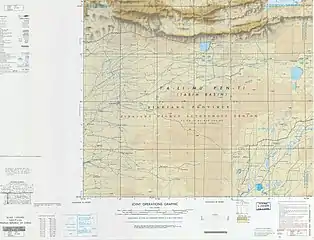 Map including Payzawat (labeled as CH'IEH-SHIH) (DMA, 1974)
Map including Payzawat (labeled as CH'IEH-SHIH) (DMA, 1974)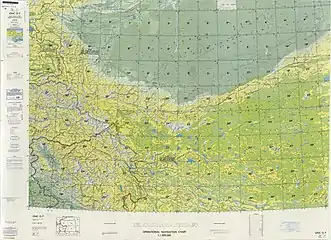 From the Operational Navigation Chart; map including Payzawat (labeled as Jiashi (Ch'ieh-shih)) (DMA, 1980)[lower-alpha 3]
From the Operational Navigation Chart; map including Payzawat (labeled as Jiashi (Ch'ieh-shih)) (DMA, 1980)[lower-alpha 3]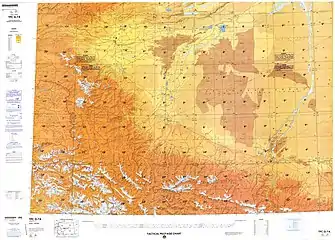 Map including Payzawat (labeled as Jiashi (Ch'ieh-shih)) (DMA, 1984)[lower-alpha 4]
Map including Payzawat (labeled as Jiashi (Ch'ieh-shih)) (DMA, 1984)[lower-alpha 4]
Notes
- ↑ Locals in Xinjiang frequently observe UTC+6 (Xinjiang Time), 2 hours behind Beijing.
- ↑ From map: "DELINEATION OF INTERNATIONAL BOUNDARIES MUST NOT BE CONSIDERED AUTHORITATIVE"
- ↑ From map: "The representation of international boundaries is not necessarily authoritative."
- ↑ From map: "The representation of international boundaries is not necessarily authoritative"
References
- 1 2 3 4 5 伽师县历史沿革. XZQH.org. 14 November 2014. Retrieved 21 March 2020.
2000年第五次人口普查,伽师县常住总人口311733人,{...}2003年,伽师县总面积6600.68平方千米,{...}县政府驻巴仁镇。{...}2010年第六次人口普查,伽师县常住总人口381767人,{...}2014年10月20日,自治区政府(新政函[2014]183号)同意撤销夏普吐勒乡,设立夏普吐勒镇。调整后,全县辖3个镇、10个乡:巴仁镇、西克尔库勒镇、夏普吐勒镇、铁日木乡、英买里乡、江巴孜乡、卧里托格拉克乡、克孜勒博依乡、米夏乡、和夏阿瓦提乡、克孜勒苏乡、古勒鲁克乡、玉代克力克乡。
- 1 2 3 夏征农; 陈至立, eds. (September 2009). 辞海:第六版彩图本 [Cihai (Sixth Edition in Color)] (in Chinese). 上海. Shanghai: 上海辞书出版社. Shanghai Lexicographical Publishing House. p. 1046. ISBN 978-7-5326-2859-9.
面积6 601平方千米。{...}1902年(清光绪二十八年)置伽师县。{...}灌溉发达。农产有小麦、玉米、高粱、棉花和甜瓜。畜牧业亦盛,以绵羊为主。特产"伽师瓜"、无核白葡萄。工业有农机、电力、制革、建材、棉花和瓜果加工等。
- ↑ Xinjiang: Prefectures, Cities, Districts and Counties
- 1 2 3 4 5 伽师概况 [Payzawat Overview]. 伽师县人民政府网 (in Simplified Chinese). 18 May 2009. Retrieved 21 March 2020.
伽师,维吾尔语称"排孜阿瓦提",意为美丽富饶的地方,{...}位于新疆维吾尔自治区西南部,东邻把楚,西接疏勒,南连岳普湖,北依天山山脉的柯坪南支,西北与克孜勒苏柯尔克孜自治州阿图什毗邻{...}是塔克拉玛干沙漠西缘的一块绿洲{...} 总人口36万,其中维吾尔族占98.9%。
- 1 2 1997年伽师县行政区划. XZQH.org (in Simplified Chinese). 19 November 2010. Retrieved 21 March 2020.
喀什地区辖县。位于塔克拉玛干沙漠西缘。面积6715.4平方千米,人口28.2万,有维吾尔、汉、柯尔克孜、回等14个民族,其中维吾尔族占97.2%,辖2镇11乡,县政府驻巴仁镇。
- 1 2 3 "DEATH TOLL RISING FAST IN XINJIANG QUAKE". Radio Free Asia. 25 February 2003. Retrieved 22 March 2020.
The two areas hardest-hit by the quake, which China says measured 6.8 on the open-ended Richter scale, were Maralbeshi and Payzawat (Jiashi) counties.{...}According to official Chinese media, Payzawat (Jiashi) has a population of at least 300,000, while Maralbeshi (Bachu) has a population of 260,000. Both counties are 90 percent Uyghur.
- 1 2 [天下财经]新疆伽师县发生6.4级地震 多人受伤 CCTV财经 (in Simplified Chinese). CCTV-2. 20 January 2020. Event occurs at 0:04, 0:16, 0:58. Archived from the original on 2021-12-17. Retrieved 2 September 2020 – via YouTube. (Note: The characters '伽师县' are clearly pronounced as 'Jiāshī Xiàn' throughout the broadcast.)
- ↑ Ministry of Housing and Urban-Rural Development (2010). 建筑抗震设计规范 [GB50011-2010: Code for Seismic Design of Buildings] (in English and Simplified Chinese). Beijing: China Architecture & Building Press. p. 203 – via Google Books.
Payzawat County
- ↑ yan, ed. (18 January 2020). "5.4-magnitude earthquake hits Xinjiang: CENC". Xinhua News Agency. Archived from the original on March 21, 2020. Retrieved 21 March 2020.
A 5.4-magnitude earthquake hit Payzawat County of Kashgar Prefecture in northwest China's Xinjiang Uygur Autonomous Region at 00:05 a.m. Saturday (Beijing Time), according to the China Earthquake Networks Center (CENC).
- ↑ Payzawat Xian (Variant - V) at GEOnet Names Server, United States National Geospatial-Intelligence Agency
- 1 2 Su Chi-Kang 蘇其康, ed. (2002). 西域史地釋名 [Compendium of Historico-Geographical Terms of Turkestan (Western Territories)] (in Chinese (Taiwan) and English). Kaohsiung: National Sun Yat-sen University Press (中山大學出版社). p. 37. ISBN 957-28052-0-7.
Faizabad{...}今新疆喀什地區伽師縣治(Payzawat)
- ↑ Eset Sulayman, Gulchehra Hoja, Jilil Kashgary, Joshua Lipes (19 May 2017). "Uyghurs Forced to Undergo Medical Exams, DNA Sampling". Radio Free Asia. Translated by Alim Seytoff and Mamatjan Juma. Retrieved 21 March 2020.
A farmer from Payziwat (Gashi) county in Kashgar (Kashi) prefecture told RFA that county officials and medical personnel had set up a health checkpoint in front of the area hospital, and local cadres "urged" residents to get examined.
{{cite web}}: CS1 maint: multiple names: authors list (link) - ↑ Reginald C. F. Schomberg and Matthew Arnold (1930). "The Climatic Conditions of the Tarim Basin". The Geographical Journal. 75 (4): 318. doi:10.2307/1784816. JSTOR 1784816.
- ↑ Michell, John; Valikhanov, Chokan Chingisovich; Venyukov, Mikhail Ivanovich (1865), The Russians in Central Asia: their occupation of the Kirghiz steppe and the line of the Syr-Daria: their political relations with Khiva, Bokhara, and Kokan: also descriptions of Chinese Turkestan and Dzungaria; by Capt. Valikhanof, M. Veniukof and [others]. Translated by John Michell, Robert Michell, E. Stanford, p. 152
- ↑ Peyziwat County Archived 2010-09-02 at the Wayback Machine. Kashgar Government.
- ↑ Andrew Roche (24 May 1988). "Racial tensions simmer on China's ancient Silk Road". Jerusalem Post. Vol. 56, no. 16834. p. 6. Retrieved 1 September 2020 – via Internet Archive.
Local government officials confirmed for the first time this month that an organized uprising against Chinese rule took place as late as the early 1980s.
Moslem peasants in Payzawat, 100 kilometres east of Kashgar, raided a military armoury and attacked Han Chinese with the stolen weapons. Units of the People's Liberation Army crushed the rebellion, with many deaths, local people from the Moslem Uighur ethnic group said.
Kashgar's vice-mayor Mohamed Emin, a Uighur but a non-Moslem Communist Party member, said a group "bent on destroying ethnic unity" had been responsible.
Payzawat - called Jiashi County by Peking - is closed to foreigners although overseas tour groups now regularly visit Kashgar. Local sources said the rebellion followed riots in Kashgar in 1981 that exploded when a Chinese shopkeeper shot dead a Uighur peasant who had parked a donkey-cart load of manure outside his premises. - ↑ Pierre-Antoine Donnet (1994). Tibet: Survival in Question. Translated by Tica Broch. Zed Books Ltd. p. 134. ISBN 1-85649-129-3 – via Internet Archive.
In the early 1980s, the local people rose up in armed rebellion against the Chinese presence in the regional centre of Payzawat. The Chinese army was called in to put down the uprising and the death toll was high.
- ↑ Dillon, Michael (2004). Xinjiang: China's Muslim far northwest. Routledge. pp. 59–60. ISBN 978-0-203-16664-2.
- ↑ Kadeer, Rebiya (2009). Dragon Fighter One Woman's Epic Struggle for Peace with China. Kales Press. p. 276-278. ISBN 978-0-9798456-1-1.
- ↑ Nabijan Tursun (2007). Uyghur Reader. Dunwoody Press. p. 141. ISBN 978-1-931546-42-3.
- ↑ "Chinastan". The Economist. 4 September 2008. Archived from the original on 18 September 2019. Retrieved 11 December 2020.
- ↑ "Attack in Jiashi Drastically Changes Security Environment". WikiLeaks. 2008 – via Internet Archive.
- ↑ 关于同意伽师县夏普吐勒乡撤乡设镇的批复(新政函[2014]183号). 新疆民政 (in Simplified Chinese). 27 October 2014. Archived from the original on 12 August 2019. Retrieved 9 April 2020.
2014年10月20日,自治区人民政府同意撤销伽师县夏普吐勒乡建制,设立夏普吐勒镇,其行政区域界线、政府驻地及隶属关系不变。
- ↑ Vicky Xiuzhong Xu; Danielle Cave; James Leibold; Kelsey Munro; Nathan Ruser (28 February 2020). "Uyghurs for sale". Australian Strategic Policy Institute. Retrieved 2 September 2020.
- ↑ "Quake causes damage, injuries in China's Xinjiang region". Taiwan News. 20 January 2020. Retrieved 21 March 2020.
- ↑ "6.4-magnitude Earthquake Jolted Xinjiang, Causing Injuries, Damaging Houses, Disrupting Service". China Central Television. 20 January 2020. Archived from the original on 2021-12-17. Retrieved 21 March 2020 – via YouTube.
- ↑ 2019年统计用区划代码和城乡划分代码:伽师县 (in Simplified Chinese). National Bureau of Statistics of the People's Republic of China. 2019. Retrieved 21 March 2020.
统计用区划代码 名称 653129100000 巴仁镇 653129101000 西克尔库勒镇 653129102000 夏普吐勒镇 653129103000 卧里托格拉克镇 653129104000 克孜勒博依镇 653129107000 和夏阿瓦提镇 653129200000 铁日木乡 653129201000 英买里乡 653129202000 江巴孜乡 653129205000 米夏乡 653129208000 克孜勒苏乡 653129209000 古勒鲁克乡 653129210000 玉代克力克乡 653129500000 兵团伽师总场
- ↑ Xie Yuzhong 解玉忠 (2003). 地名中的新疆 (in Simplified Chinese). Ürümqi: 新疆人民出版社. pp. 225–228. ISBN 7-228-08004-1.
- ↑ بارىن بازىرى ئالاھىدە كەسىپلەر ئارقىلىق بېيىش يولىغا ئاتلاندى. People's Daily (in Uyghur). 8 January 2018. Retrieved 22 March 2020.
پەيزاۋات ناھىيەسىنىڭ بارىن بازىرى ناھىيە ئىچىگە جايلاشقان.
- ↑ Alessandra Cappelletti (2020). Socio-Economic Development in Xinjiang Uyghur Autonomous Region Disparities and Power Struggle in China's North-West. Palgrave Macmillan. p. 243. ISBN 978-981-15-1536-1 – via Google Books.
Xiaputule/Shaptul (夏普吐勒乡, شاپتۇل يېزىسى), Village 13, 14 and 15, in Jiashi/Peyzawat County
- ↑ Kizilsu (Approved - N) at GEOnet Names Server, United States National Geospatial-Intelligence Agency
- ↑ Herold J. Wiens (November 1966). "Cultivation Development and Expansion in China's Colonial Realm in Central Asia". The Journal of Asian Studies. 26 (1): 75. doi:10.2307/2051832. JSTOR 2051832. S2CID 162339064.
- ↑ 3-7 各地、州、市、县(市)分民族人口数 (in Simplified Chinese). Statistic Bureau of Xinjiang Uygur Autonomous Region. 15 March 2017. Archived from the original on 11 October 2017. Retrieved 3 September 2017.
- ↑ Morris Rossabi, ed. (2004). Governing China's Multiethnic Frontiers (PDF). University of Washington Press. p. 179. ISBN 0-295-98390-6.
- ↑ 中国气象数据网 – WeatherBk Data (in Simplified Chinese). China Meteorological Administration. Retrieved 10 October 2023.
- ↑ 中国气象数据网 (in Simplified Chinese). China Meteorological Administration. Retrieved 10 October 2023.